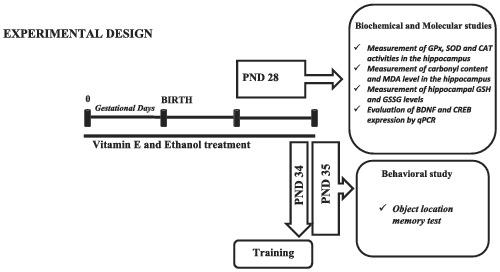当前位置:
X-MOL 学术
›
Int. J. Dev. Neurosci.
›
论文详情
Our official English website, www.x-mol.net, welcomes your
feedback! (Note: you will need to create a separate account there.)
Maternal ethanol exposure induces behavioral deficits through oxidative stress and brain-derived neurotrophic factor interrelation in rat offspring
International Journal of Developmental Neuroscience ( IF 1.7 ) Pub Date : 2021-08-24 , DOI: 10.1002/jdn.10148 Rahebeh Mahdinia 1 , Iran Goudarzi 1 , Taghi Lashkarbolouki 1 , Mahmoud Elahdadi Salmani 1
International Journal of Developmental Neuroscience ( IF 1.7 ) Pub Date : 2021-08-24 , DOI: 10.1002/jdn.10148 Rahebeh Mahdinia 1 , Iran Goudarzi 1 , Taghi Lashkarbolouki 1 , Mahmoud Elahdadi Salmani 1
Affiliation

|
Alcohol consumption during pregnancy damages the central nervous system of developing fetus and results in persistent physical and neurobehavioral abnormalities, including learning and memory disorders. The hippocampus which is involved in learning and memory is highly susceptible to the ethanol neurotoxic effects. Oxidative stress is one of the mechanisms in alcohol-induced disorders. Ethanol also interferes with the brain-derived neurotrophic factors (BDNF) expression. Using vitamin E as a potent antioxidant, we studied the possible interrelation between oxidative stress and BDNF on cognition. Ethanol (4 g/kg) and vitamin E (100, 200, and 400 mg/kg) were given to pregnant Wistar rats on first day of gestation (GD) until weaning (28 days). Oxidative stress marker, BDNF expression, and cyclic AMP-response binding-protein (CREB) expression levels were measured on postnatal days (PND) 28. Object location memory (OLM) was evaluated on PND 34. Our results demonstrated that ethanol exposure significantly reduced glutathione peroxidase (GPx) activity, reduced glutathione (GSH), reduced/oxidized glutathione (GSH/GSSG) ratio, and increased superoxide dismutase (SOD) activity, malondialdehyde (MDA) levels, and carbonyl protein content in the hippocampus. Total BDNF, BDNF mRNA, and CREB expression significantly reduced in the hippocampus by ethanol exposure. Also, ethanol significantly reduced the discrimination index (DI) in the OLM test. In addition, vitamin E administration could reduce oxidative stress, increase significantly BDNF and CREB levels, and improve cognitive dysfunction induced by ethanol exposure. Collectively, results suggest that probably oxidative stress can interrelate with the BDNF system for modulating cognitive function in the ethanol-exposed rat.
中文翻译:

母体乙醇暴露通过大鼠后代的氧化应激和脑源性神经营养因子相互关系诱导行为缺陷
怀孕期间饮酒会损害胎儿发育的中枢神经系统,并导致持续的身体和神经行为异常,包括学习和记忆障碍。参与学习和记忆的海马体对乙醇的神经毒性作用高度敏感。氧化应激是酒精引起的疾病的机制之一。乙醇还会干扰脑源性神经营养因子 (BDNF) 的表达。使用维生素 E 作为有效的抗氧化剂,我们研究了氧化应激和 BDNF 对认知的可能相互关系。在妊娠第一天 (GD) 至断奶 (28 天) 给怀孕的 Wistar 大鼠注射乙醇 (4 g/kg) 和维生素 E (100、200 和 400 mg/kg)。氧化应激标记,BDNF 表达,在出生后第 28 天 (PND) 测量和循环 AMP 反应结合蛋白 (CREB) 表达水平。在 PND 34 上评估对象位置记忆 (OLM)。我们的结果表明,乙醇暴露显着降低了谷胱甘肽过氧化物酶 (GPx) 的活性,还原型谷胱甘肽 (GSH)、还原/氧化型谷胱甘肽 (GSH/GSSG) 比值,以及海马中超氧化物歧化酶 (SOD) 活性、丙二醛 (MDA) 水平和羰基蛋白含量增加。乙醇暴露在海马中的总 BDNF、BDNF mRNA 和 CREB 表达显着降低。此外,乙醇显着降低了 OLM 测试中的辨别指数 (DI)。此外,维生素 E 给药可以减少氧化应激,显着增加 BDNF 和 CREB 水平,并改善乙醇暴露引起的认知功能障碍。集体,
更新日期:2021-08-24
中文翻译:

母体乙醇暴露通过大鼠后代的氧化应激和脑源性神经营养因子相互关系诱导行为缺陷
怀孕期间饮酒会损害胎儿发育的中枢神经系统,并导致持续的身体和神经行为异常,包括学习和记忆障碍。参与学习和记忆的海马体对乙醇的神经毒性作用高度敏感。氧化应激是酒精引起的疾病的机制之一。乙醇还会干扰脑源性神经营养因子 (BDNF) 的表达。使用维生素 E 作为有效的抗氧化剂,我们研究了氧化应激和 BDNF 对认知的可能相互关系。在妊娠第一天 (GD) 至断奶 (28 天) 给怀孕的 Wistar 大鼠注射乙醇 (4 g/kg) 和维生素 E (100、200 和 400 mg/kg)。氧化应激标记,BDNF 表达,在出生后第 28 天 (PND) 测量和循环 AMP 反应结合蛋白 (CREB) 表达水平。在 PND 34 上评估对象位置记忆 (OLM)。我们的结果表明,乙醇暴露显着降低了谷胱甘肽过氧化物酶 (GPx) 的活性,还原型谷胱甘肽 (GSH)、还原/氧化型谷胱甘肽 (GSH/GSSG) 比值,以及海马中超氧化物歧化酶 (SOD) 活性、丙二醛 (MDA) 水平和羰基蛋白含量增加。乙醇暴露在海马中的总 BDNF、BDNF mRNA 和 CREB 表达显着降低。此外,乙醇显着降低了 OLM 测试中的辨别指数 (DI)。此外,维生素 E 给药可以减少氧化应激,显着增加 BDNF 和 CREB 水平,并改善乙醇暴露引起的认知功能障碍。集体,











































 京公网安备 11010802027423号
京公网安备 11010802027423号